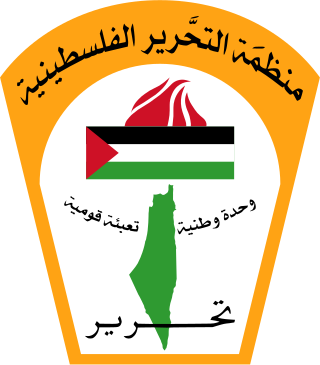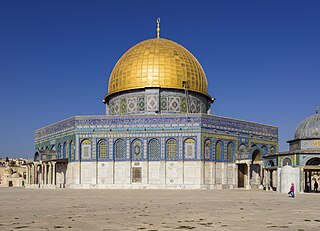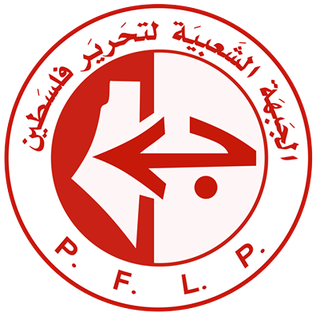
The Palestine Liberation Organization is a Palestinian nationalist coalition that is internationally recognized as the official representative of the Palestinian people; i.e. the globally dispersed population, not just those in the Palestinian territories who are represented by the Palestinian Authority. Founded in 1964, it initially sought to establish an Arab state over the entire territory of the former Mandatory Palestine, advocating the elimination of the State of Israel. However, in 1993, the PLO recognized Israeli sovereignty with the Oslo I Accord, and now only seeks Arab statehood in the Palestinian territories that have been militarily occupied by Israel since the 1967 Arab–Israeli War.

The history of the State of Palestine describes the creation and evolution of the State of Palestine in the West Bank and Gaza Strip. During the Mandatory period, numerous plans of partition of Palestine were proposed but without the agreement of all parties. In 1947, the United Nations Partition Plan for Palestine was voted for. The leaders of the Jewish Agency for Palestine accepted parts of the plan, while Arab leaders refused it. This triggered the 1947–1949 Palestine war and led, in 1948, to the establishment of the state of Israel on a part of Mandate Palestine as the Mandate came to an end.

The United Nations General Assembly Resolution 194 is a resolution adopted near the end of the 1947–1949 Palestine war. The Resolution defines principles for reaching a final settlement and returning Palestine refugees to their homes. Article 11 of the resolution resolves that
refugees wishing to return to their homes and live at peace with their neighbours should be permitted to do so at the earliest practicable date, and that compensation should be paid for the property of those choosing not to return and for loss of or damage to property which, under principles of international law or equity, should be made good by the Governments or authorities responsible.
The Arab League was formed in Cairo on 22 March 1945 with six members: Egypt, Iraq, Transjordan, Lebanon, Saudi Arabia, and Syria. Yemen joined on 5 May 1945. Since its formation the Arab League has promoted the Palestinian Arab cause in the Israeli–Palestinian conflict, including by imposing the Arab League boycott of Israel. The Arab League opposed the United Nations Partition Plan for Palestine in 1947. On 15 May 1948, the then seven Arab League members coordinated an invasion of what was by then the former British Mandate, marking the start of the 1948 Arab–Israeli War.
The Letters of Mutual Recognition were exchanged between Israel and the Palestine Liberation Organization on 9 September 1993. In their correspondence, Israeli prime minister Yitzhak Rabin and Palestinian political leader Yasser Arafat agreed to begin cooperating towards a peaceful solution to the Israeli–Palestinian conflict. The PLO recognized Israel's right to exist in peace, renounced Palestinian militancy and terrorism, and accepted UNSC Resolution 242 and UNSC Resolution 338. Israel recognized the PLO as a legitimate authority representing the Palestinian people and agreed to commence comprehensive negotiations for the Israeli–Palestinian peace process. These initial agreements between Rabin and Arafat laid the groundwork for the Oslo I Accord on 13 September 1993, effectively serving as its preamble.
The 1974 Arab League summit was a meeting of the Arab League held in Rabat, Morocco, in October 1974. Leaders of twenty Arab countries were present, including King Hussein of Jordan and Anwar Sadat of Egypt, together with representatives of the Palestine Liberation Organization (PLO).

The Steadfastness and Confrontation Front was a political initiative of 4 December 1977 by the Palestine Liberation Organization (PLO) and the governments of Libya, Algeria, Syria and South Yemen following the visit by Egyptian President Anwar Sadat to Israel on 19 November 1977, which was widely seen in the Arab world as an abandonment of the previously-agreed principle of withholding recognition of Israel and as breaking the Arab alliance against Israel.

The bilateral relations between the State of Palestine and Russia have a complex history, deeply interwoven with Russian and Soviet relations with the Israeli enterprise, Palestinian nationalism, and Third World national liberation movements. Between 1956 and 1990, Soviet–Palestinian relations were part of the then-ongoing Soviet–American confrontation.

China–Palestine relations, also referred to as Sino–Palestinian relations, encompass the long bilateral relationship between China and Palestine dating back from the early years of the Cold War.

Political relations between the State of Palestine and the United States have been complex and strained since the 1960s. While the U.S. does not recognize the State of Palestine, it recognizes the Palestine Liberation Organization (PLO) as the legitimate representative entity for the Palestinian people; following the Oslo Accords, it recognized the Palestinian National Authority as the legitimate Palestinian government of the Palestinian territories.
PLO's Ten Point Program is the plan accepted by the Palestinian National Council (PNC), the legislative body of the Palestine Liberation Organization (PLO), at its 12th meeting held in Cairo on 8 June 1974.

The Oslo Accords are a pair of interim agreements between Israel and the Palestine Liberation Organization (PLO): the Oslo I Accord, signed in Washington, D.C., in 1993; and the Oslo II Accord, signed in Taba, Egypt, in 1995. They marked the start of the Oslo process, a peace process aimed at achieving a peace treaty based on Resolution 242 and Resolution 338 of the United Nations Security Council. The Oslo process began after secret negotiations in Oslo, Norway, resulting in both the recognition of Israel by the PLO and the recognition by Israel of the PLO as the representative of the Palestinian people and as a partner in bilateral negotiations.
The foreign relations of the State of Palestine have been conducted since the establishment of the Palestine Liberation Organization (PLO) in 1964. Since the Oslo Accords, it seeks to obtain universal recognition for the State of Palestine on the 1967 borders, with East Jerusalem as its capital. As of 21 June 2024, 145 of the 193 United Nations (UN) member states officially recognize the State of Palestine.

The Palestinian Declaration of Independence formally established the State of Palestine, and was written by Palestinian poet Mahmoud Darwish and proclaimed by Yasser Arafat on 15 November 1988 in Algiers, Algeria. It had previously been adopted by the Palestinian National Council (PNC), the legislative body of the Palestine Liberation Organization (PLO), by a vote of 253 in favour, 46 against, and 10 abstaining. It was read at the closing session of the 19th PNC to a standing ovation. Upon completing the reading of the declaration, Arafat, as Chairman of the PLO, assumed the title of President of Palestine. In April 1989, the PLO Central Council elected Arafat as the first President of the State of Palestine.

The Popular Front for the Liberation of Palestine is a secular Palestinian Marxist–Leninist and revolutionary socialist organization founded in 1967 by George Habash. It has consistently been the second-largest of the groups forming the Palestine Liberation Organization, the largest being Fatah.

The Democratic Front for the Liberation of Palestine is a secular Palestinian Marxist–Leninist and Maoist organization. It is also frequently referred to as the Democratic Front, or al-Jabha al-Dīmūqrāṭiyya. It is a member organization of the Palestine Liberation Organization, the Alliance of Palestinian Forces and the Democratic Alliance List.

The Palestinian National Covenant or Palestinian National Charter is the covenant or charter of the Palestine Liberation Organization (PLO). The Covenant is an ideological paper, written in the early days of the PLO.

Israel–Libya relations describes the relations between Israel and Libya. While there have been no formal diplomatic agreements between Israel and Libya since Libya's independence, there have been some notable events and developments in their relationship over the years. One of the main reasons for Libya's antagonism towards Israel has been its support for the Palestinian cause. Libya, under the rule of Muammar Gaddafi, was a staunch supporter of the Palestinian cause and provided aid and support to various Palestinian militant groups.
The Reagan peace plan, also known as the Reagan Middle East peace plan, was announced by United States president Ronald Reagan during a speech on September 1, 1982. The plan's stated goals was to "reconcile Israel's legitimate security concerns with the legitimate rights of the Palestinians." It proposed a five-year transition period, during which Palestinians in the West Bank and Gaza would obtain full autonomy, and an association of the territories with Jordan.

Anti-Terrorism Act of 1987 originated in the 100th United States Congress as four articles of anti-terrorism legislation. The United States House of Representatives bill H.R. 2587 was endorsed by eighty cosponsors while the United States Senate bill S. 1203 was endorsed by forty-nine cosponsors of the 100th United States Congress. The Act of Congress established prohibitions concerning the preoccupation of the Palestine Liberation Organization as a terrorist organization creating instability and meddling in the diplomatic relations of the Arab League and Middle East.















